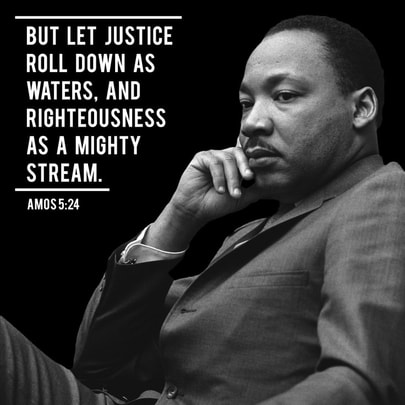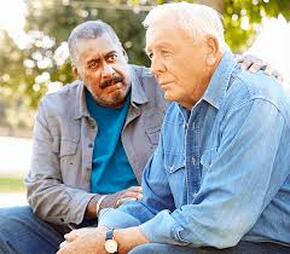Injustice is simply a lack of fairness. In other words, injustice is not impartial, it is not just treatment or behavior. Injustice is favoritism or discrimination. Injustice happens all too often in our fallen world. It can be age, racial or gender discrimination. It can be religious or ethnic discrimination. It can take place with healthcare inequality. It can take place in several other areas as well.
When the Bible says that we can let justice run down like a river, that gives those who experience injustice hope but what exactly does it mean?
Amos 5:24 NKJV But let justice run down like water, And righteousness like a mighty stream.
When you take this verse in context you will find that God is saying that He is upset with the nation of Israel's phony worship.
Here it is in context from the Message Bible ;
Amos 5:21-24 MSG “I can’t stand your religious meetings. I’m fed up with your conferences and conventions. I want nothing to do with your religion projects, your pretentious slogans and goals. I’m sick of your fund-raising schemes, your public relations and image making. I’ve had all I can take of your noisy ego-music. When was the last time you sang to me? Do you know what I want? I want justice—oceans of it. I want fairness—rivers of it. That’s what I want. That’s all I want.
What Does "Let Justice Run Down Like a River" Mean?
The phrase “Let justice run down like a river” means that we should cooperate with God so that his justice will run down from his Spirit into us and out into the world through our lives. God is saying that he doesn’t want us to worship him through empty religious rituals, but instead to worship him through living lifestyles that are characterized by justice. God wants our moral character to align with His commitment to justice. God is upset when He sees us going through the motions of worship without truly working for justice. When we perform acts of justice, our just God considers those to be acts of worship.
Today in the church we engage in many different religious activities. We meet for worship services, read scripture, sing praise and worship songs, pray, preach, give offerings, etc. However, our daily lives reveal that we often neglect honesty and help for people in need, people like those who are poor and underserved. We make a show of being faithful through religious rituals, but we are unfaithful in how we live from day to day.
God is looking for people who are willing to cooperate with His work of bringing justice to our world. Those who do so will see God’s justice flow powerfully through their lives like the mighty current of a river.
Rather than just going through religious activities – such as praying, reading the Bible, going to church, and singing worship songs – without trying to change the corruption around us, we should do something about the injustices we see every day Whenever we run into a situation that is unjust, we should listen to God speaking to us through our conscience. God wants us to agree with Him that those unjust situations are wrong, and to do what we can to make those situations right by relying on the power of the Holy Spirit flowing through us.
God uses people to bless others and to change the world. It doesn’t just happen by magic. Things change and happen when we cooperate with God by acting in faith and doing what God calls us to do. We need to stop passively crying about injustice. We need to start acting in faith and make justice happen. Justice will happen when we invite God to send his love and wisdom flowing through us and out into the world
God is calling all of us to choose to work for good when we’re confronted by injustice. God is seeking worshipers who will faithfully connect to His Spirit and follow the truth of what God leads them to do. These are the kind of worshipers that God is looking for.
John 4:22-24 NIV You Samaritans worship what you do not know; we worship what we do know, for salvation is from the Jews. Yet a time is coming and has now come when the true worshipers will worship the Father in the Spirit and in truth, for they are the kind of worshipers the Father seeks. God is spirit, and his worshipers must worship in the Spirit and in truth.” (Emphasis mine)
It’s not enough just to have the right beliefs; we also must have the right actions. Justice and righteousness go together.
Micah 6:8 NIV He has shown you, O mortal, what is good. And what does the Lord require of you? To act justly and to love mercy and to walk humbly with your God.
Psalms 33:5 NIV The Lord loves righteousness and justice; the earth is full of his unfailing love.
Justice involves righting wrongs in society, while righteousness is doing right by people in need. As justice runs down through our lives and out into the world, we act on what God calls us to do both as a society and as individuals.
Rather than trying to please God through religious rituals alone, we should pursue justice and righteousness, because that’s what God says matters most to him.
Jeremiah 9:23-24 NIV This is what the Lord says: “Let not the wise boast of their wisdom or the strong boast of their strength or the rich boast of their riches, but let the one who boasts boast about this: that they have the understanding to know me, that I am the Lord, who exercises kindness, justice and righteousness on earth, for in these I delight,” declares the Lord. (Emphasis mine).
When we let justice run down like a river, we will become conduits for God’s Spirit to flow through, bringing justice to unjust situations, and blessing us and others in a ripple effect of mighty, never-failing power!












 RSS Feed
RSS Feed